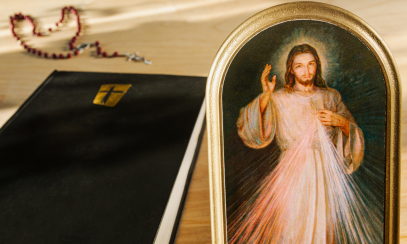
The Good News of Amoris Laetitia and the Messiness of Life
During the month of October, we call awareness to the Church’s good news about human life for Respect Life Month. A part of the Gospel of life is the good news that is the Christian vision of marriage and family. This year, we celebrate a year dedicated by Pope Francis to Amoris Laetitia, or the joy of love.
During the month of October, we call awareness to the Church’s good news about human life for Respect Life Month. A part of the Gospel of life is the good news that is the Christian vision of marriage and family. This year, we celebrate a year dedicated by Pope Francis to Amoris Laetitia, or the joy of love.
Released in 2016, Amoris Laetitia is a document that the Holy Father released after a synod, or gathering, of bishops from throughout the world that takes place every few years; generally it’s focused on a particular topic. The bishops met twice, an extraordinary synod in 2014 and an ordinary synod in 2015. The extra meeting shows the great concern that the leaders of the Church have for the life of the family and the many challenges facing this vital unit of the Church and of society.
Many issues were brought up during the synodal process and in the document that it inspired, but the media coverage of the few Church disagreements about the document took center stage. Unfortunately, that drew attention away from the central themes that the synod fathers and the pope identified.
Ironically, some of the controversy centered around a perceived murkiness in the pope’s way of addressing morality. Pope Francis intentionally highlights a kind of murkiness; however, what he was emphasizing is not some kind of confusion about the Church’s teaching — rather, it is the murkiness and messiness that is everyday life, particularly the everyday life of the family.
This was the very mess into which the Son of God came down to dwell and then to transform.
Pope Francis points out that the married couple is an “icon” of God’s love, particularly in their life-giving capacity (AL 11), and this icon of the family is best expressed by the Holy Family. He was quick to point out that suffering and hardship were also a part of their experience — for example the flight into Egypt to escape Herod’s violent plans (AL 30).
Even when we look at the ideal family, we see the effects of human sinfulness in the world around them making their lives less than ideal. The beauty of the family is not some idealized perfection — that is the work of greeting card marketing and social media posts, not the work of the Gospel. The work of the Gospel is to enter into a broken, messed up and murky world in order to transform it.
There is a lot of messiness in the life of the family. Some of it is the routine messiness of life, some is the negative influence of the society around us — and some is the brokenness of human sinfulness. While each of these might take on new appearances, they have always been at play in the life of the family. The message of Pope Francis is to build up the family by first having a realistic view of ourselves and those around us. This does not mean a lowering of our standards (or a shift in Church teaching), but rather a greater reliance on mercy and grace.
It is important to remember that salvation history tells us that God’s grace works in a broken world and that transformation is possible. As he has consistently shown, God is able to work with our mess. We don’t rejoice in the less-than-ideal character of the world or ourselves, but we should celebrate the transforming influence that is the grace of the Gospel — particularly as it is lived out, with various levels of imperfection, in our families.
The good news is that God wants to use the family to transform the world — and even an imperfect family can be a vehicle for His grace.
Michael Martocchio, Ph.D., is the diocesan secretary for evangelization and director of the Office of Catechesis and Christian Initiation. Email him at mmartocchio@charlestondiocese.org.



